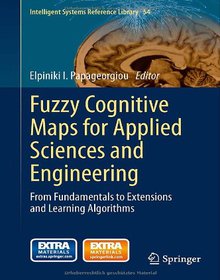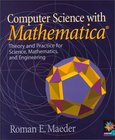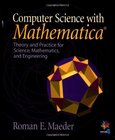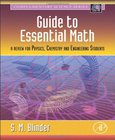Fuzzy Cognitive Maps for Applied Sciences and Engineering
From Fundamentals to Extensions and Learning Algorithms

Book Details:
| Publisher: | Springer |
| Series: | Springer , Fundamentals |
| Author: | Elpiniki I. Papageorgiou |
| Edition: | 1 |
| ISBN-10: | 3642397387 |
| ISBN-13: | 9783642397387 |
| Pages: | 395 |
| Published: | Dec 17 2013 |
| Posted: | Nov 19 2014 |
| Language: | English |
| Book format: | |
| Book size: | 12.43 MB |
Book Description:
Fuzzy Cognitive Maps (FCM) constitute cognitive models in the form of fuzzy directed graphs consisting of two basic elements: the nodes, which basically correspond to concepts bearing different states of activation depending on the knowledge they represent, and the edges denoting the causal effects that each source node exercises on the receiving concept expressed through weights. Weights take values in the interval [-1,1], which denotes the positive, negative or neutral causal relationship between two concepts. An FCM can be typically obtained through linguistic terms, inherent to fuzzy systems, but with a structure similar to the neural networks, which facilitates data processing, and has capabilities for training and adaptation.During the last 10 years, an exponential growth of published papers in FCMs was followed showing great impact potential. Different FCM structures and learning schemes have been developed, while numerous studies report their use in many contexts with highly successful modeling results. The aim of this book is to fill the existing gap in the literature concerning fundamentals, models, extensions and learning algorithms for FCMs in knowledge engineering. It comprehensively covers the state-of-the-art FCM modeling and learning methods, with algorithms, codes and software tools, and provides a set of applications that demonstrate their various usages in applied sciences and engineering.
Download Link:
Related Books:
Computer Science with MATHEMATICA
Theory and Practice for Science, Mathematics, and Engineering
Computer algebra systems have revolutionized the use of computers within mathematics research, and are currently extending that revolution to the undergraduate mathematics curriculum. But the power of such systems goes beyond simple algebraic or numerical manipulation. In this practical resource Roman Maeder shows how computer-aided mathematics has reached a level where it can support effectively many of the computations in science and engineering. Besides treating traditional computer science topics, he demonstrates how scientists and engineers can use these computer-based tools to do scientific computations. A valuable text for computer science courses for scientists and engineers, this book will also prove useful to Mathematica users at all levels...
Computer Science with MATHEMATICA
Theory and Practice for Science, Mathematics and Engineering
Computer algebra systems have revolutionized the use of computers within mathematics research, and are currently extending that revolution to the undergraduate mathematics curriculum. But the power of such systems goes beyond simple algebraic or numerical manipulation. This book shows how computer-aided mathematics has reached a level where it can support effectively many of the computations in science and engineering. In addition to treating traditional computer science topics, an introductory course should show scientists and engineers how these computer-based tools can be used to do scientific computations. A valuable text for computer science courses for scientists and engineers, this book should also prove useful to Mathematica users at all leve...
Guide to Essential Math
A Review for Physics, Chemistry and Engineering Students
This book reminds students in junior, senior and graduate level courses in physics, chemistry and engineering of the math they may have forgotten (or learned imperfectly) which is needed to succeed in science courses. The focus is on math actually used in physics, chemistry and engineering, and the approach to mathematics begins with 12 examples of increasing complexity, designed to hone the student's ability to think in mathematical terms and to apply quantitative methods to scientific problems. By the author's design, no problems are included in the text, to allow the students to focus on their science course assignments. - Highly accessible presentation of fundamental mathematical techniques needed in science and engineering courses- Use of proven...
2007 - 2021 © eBooks-IT.org



